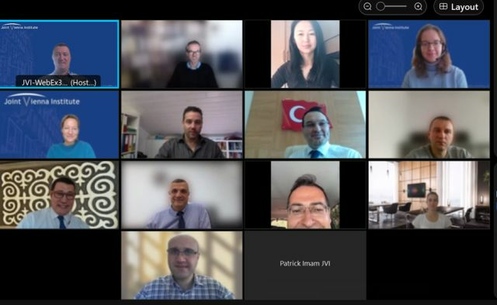- English | Русский


To respond to emerging demand in client countries and issues arising in the broad landscape of economic policies, the JVI is continually upgrading its course offerings. One such course is on the “Future of Work: Opportunities and Challenge for Jobs Earnings and Inequality,” which was organized by the Joint Vienna Institute (JVI), in cooperation with the International Labor Organization (ILO) and delivered virtually for the second time during November 1-5, 2021.
The world of work is currently undergoing significant changes. New technologies, the green transition, demographic shifts, a slowdown in globalization and political uncertainty are creating substantial pressures on workers and firms. Changes in tasks and occupations threaten traditional career paths, creating job risks and putting pressure on wages. At the same time, new activities emerge that require new skill sets, geographical mobility, and flexible work arrangements.
The course explores these multiple dimensions of labor market transformation, both those that were under way well before COVID-19 hit, as well as new ones emerging and accelerating amid the pandemic. While the future is inherently difficult to predict, participants are provided with analytical tools and instruments to measure and evaluate the changes to come. The course assesses the labor market impact, and the potential policy implications, of major global trends, including automation and digitalization, aging, regional disparities, teleworking, and structural transformations arising from the transition to greener growth for instance. The lecturers provided an overview of policy measures meant to respond to labor market challenges and to foster a transition to better-quality jobs. Apart from lectures, the program included several workshops and country case studies. The lecturers stimulated interactivity by asking participants to share their home country experience.
The group of participants consisted of highly motivated experts, including from Ministries of Labor and Planning, and from across the JVI region and beyond. The course was very well received and highly rated, with the course content viewed as useful for participants’ job and professional development. Discussions were very lively, with participants appreciating the broad range of topics covered in the course as well as lecturers’ diverse background.
Going forward, the pandemic situation permitting, the course is scheduled to be delivered in a face-to-face format in Vienna from October 31 till November 4, 2022. The intention will be to expand the coverage to the course to englobe the gender viewpoint, to go deeper into the demographic aspect, and to discuss trade-related topics and implications of labor market trends for monetary policy and financial stability. The face-to-face format will also allow for more practical workshops focusing on labor market dynamics analysis and a toolbox for defining labor market reform priorities.
Patrick Imam, Deputy Director, Joint Vienna Institute
Tatiana Evdokimova, Economist, Joint Vienna Institute